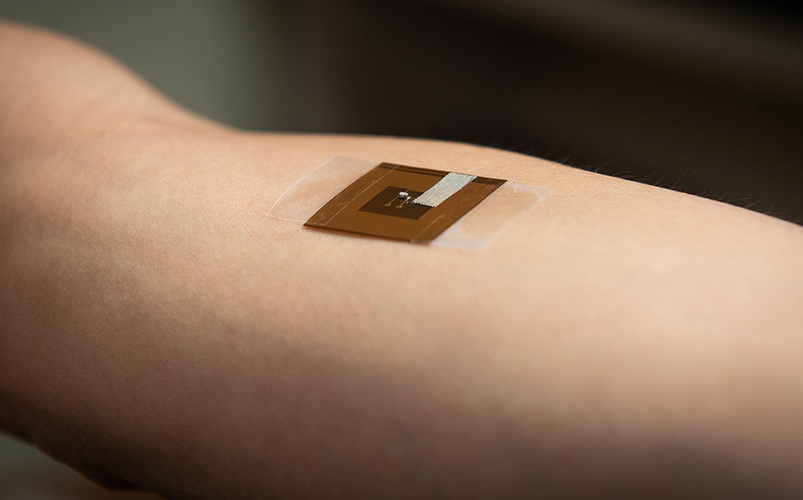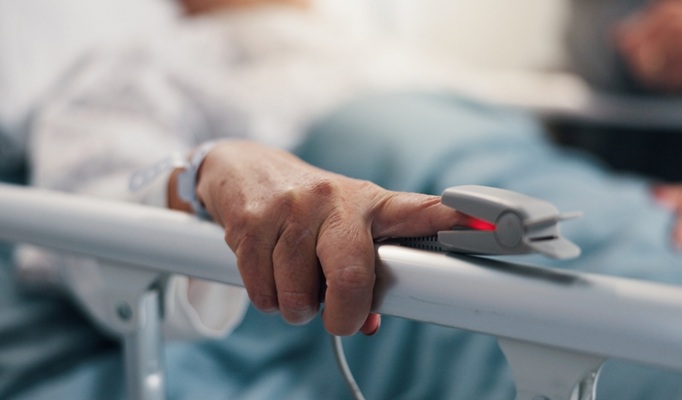Use of Statins to Lower Cholesterol Increases Survival by 50% in Severe COVID-19 Patients, Finds New Study
|
By HospiMedica International staff writers Posted on 02 Mar 2021 |

Image: Colorized scanning electron micrograph of a cell infected with SARS-COV-2 (Photo courtesy of NIAID)
People who took statins to lower cholesterol were approximately 50% less likely to die if hospitalized for COVID-19, according to a new study.
In the study, physicians at Columbia University Irving Medical Center (New York, NY, USA) looked at outcomes for 2,626 patients with COVID-19 who were admitted to a quaternary academic medical center in Manhattan during the first 18 weeks of the pandemic. The researchers compared 648 patients who regularly used statins before developing COVID-19 to 648 patients who did not use statins. Patients in each group were matched so that there were no significant differences in demographics, comorbidities, or use of other medications at home.
Among the statin users, 96 (14.8%) died in the hospital within 30 days of admission compared with 172 (26.5%) of patients who did not use statins. When other differences among the patients were factored in, the researchers found that statin use was significantly associated with a 50% reduction in in-hospital mortality (within 30 days). Patients on statins also tended to have lower levels of C-reactive protein, a marker of inflammation. Statin use was not associated with a statistically significant decrease in the use of invasive mechanical ventilation (18.6% in statin users vs. 21.9%), days on a ventilator (13.5 vs. 12.8), or length of hospital stay (7 vs. 7).
Other studies and meta-analyses from China have also suggested a survival benefit from statins among COVID-19 patients. However, these results may not apply to patients in Western countries who generally have more cardiovascular disease. The current study is one of the larger studies confirming the association. Smaller retrospective studies out of North America and Europe have found similar results. Although the current study compared closely matched participants and adjusted for other variables, as a retrospective analysis, unknown factors could explain the results. Several randomized trials are underway, including studies to determine if statins can prevent hospitalization in outpatients, and lower the risk of death when given to hospitalized patients.
“Our study is one of the larger studies confirming this hypothesis and the data lay the groundwork for future randomized clinical trials that are needed to confirm the benefit of statins in COVID-19,” said Aakriti Gupta, MD, a cardiologist at NewYork-Presbyterian/Columbia University Irving Medical Center and one of the co-lead authors of the study.
“If their beneficial effect bears out in randomized clinical trials, statins could potentially prove to be a low-cost and effective therapeutic strategy for COVID-19,” added co-lead author Mahesh V. Madhavan, MD, also a cardiologist at NewYork-Presbyterian/Columbia University Irving Medical Center.
Related Links:
Columbia University Irving Medical Center
In the study, physicians at Columbia University Irving Medical Center (New York, NY, USA) looked at outcomes for 2,626 patients with COVID-19 who were admitted to a quaternary academic medical center in Manhattan during the first 18 weeks of the pandemic. The researchers compared 648 patients who regularly used statins before developing COVID-19 to 648 patients who did not use statins. Patients in each group were matched so that there were no significant differences in demographics, comorbidities, or use of other medications at home.
Among the statin users, 96 (14.8%) died in the hospital within 30 days of admission compared with 172 (26.5%) of patients who did not use statins. When other differences among the patients were factored in, the researchers found that statin use was significantly associated with a 50% reduction in in-hospital mortality (within 30 days). Patients on statins also tended to have lower levels of C-reactive protein, a marker of inflammation. Statin use was not associated with a statistically significant decrease in the use of invasive mechanical ventilation (18.6% in statin users vs. 21.9%), days on a ventilator (13.5 vs. 12.8), or length of hospital stay (7 vs. 7).
Other studies and meta-analyses from China have also suggested a survival benefit from statins among COVID-19 patients. However, these results may not apply to patients in Western countries who generally have more cardiovascular disease. The current study is one of the larger studies confirming the association. Smaller retrospective studies out of North America and Europe have found similar results. Although the current study compared closely matched participants and adjusted for other variables, as a retrospective analysis, unknown factors could explain the results. Several randomized trials are underway, including studies to determine if statins can prevent hospitalization in outpatients, and lower the risk of death when given to hospitalized patients.
“Our study is one of the larger studies confirming this hypothesis and the data lay the groundwork for future randomized clinical trials that are needed to confirm the benefit of statins in COVID-19,” said Aakriti Gupta, MD, a cardiologist at NewYork-Presbyterian/Columbia University Irving Medical Center and one of the co-lead authors of the study.
“If their beneficial effect bears out in randomized clinical trials, statins could potentially prove to be a low-cost and effective therapeutic strategy for COVID-19,” added co-lead author Mahesh V. Madhavan, MD, also a cardiologist at NewYork-Presbyterian/Columbia University Irving Medical Center.
Related Links:
Columbia University Irving Medical Center
Latest COVID-19 News
- Low-Cost System Detects SARS-CoV-2 Virus in Hospital Air Using High-Tech Bubbles
- World's First Inhalable COVID-19 Vaccine Approved in China
- COVID-19 Vaccine Patch Fights SARS-CoV-2 Variants Better than Needles
- Blood Viscosity Testing Can Predict Risk of Death in Hospitalized COVID-19 Patients
- ‘Covid Computer’ Uses AI to Detect COVID-19 from Chest CT Scans
- MRI Lung-Imaging Technique Shows Cause of Long-COVID Symptoms
- Chest CT Scans of COVID-19 Patients Could Help Distinguish Between SARS-CoV-2 Variants
- Specialized MRI Detects Lung Abnormalities in Non-Hospitalized Long COVID Patients
- AI Algorithm Identifies Hospitalized Patients at Highest Risk of Dying From COVID-19
- Sweat Sensor Detects Key Biomarkers That Provide Early Warning of COVID-19 and Flu
- Study Assesses Impact of COVID-19 on Ventilation/Perfusion Scintigraphy
- CT Imaging Study Finds Vaccination Reduces Risk of COVID-19 Associated Pulmonary Embolism
- Third Day in Hospital a ‘Tipping Point’ in Severity of COVID-19 Pneumonia
- Longer Interval Between COVID-19 Vaccines Generates Up to Nine Times as Many Antibodies
- AI Model for Monitoring COVID-19 Predicts Mortality Within First 30 Days of Admission
- AI Predicts COVID Prognosis at Near-Expert Level Based Off CT Scans
Channels
Critical Care
view channel
Wearable Patch for Early Skin Cancer Detection to Reduce Unnecessary Biopsies
Skin cancer remains one of the most dangerous and common cancers worldwide, with early detection crucial for improving survival rates. Traditional diagnostic methods—visual inspections, imaging, and biopsies—can... Read more
Pulse Oximeter Index Offers Non-Invasive Guides for Fluid Therapy
In patients with acute circulatory failure, deciding whether to administer intravenous fluids is often a life-or-death decision. Too little fluid can leave organs underperfused, while too much can cause... Read moreSurgical Techniques
view channel
Robotic Assistant Delivers Ultra-Precision Injections with Rapid Setup Times
Age-related macular degeneration (AMD) is a leading cause of blindness worldwide, affecting nearly 200 million people, a figure expected to rise to 280 million by 2040. Current treatment involves doctors... Read more
Minimally Invasive Endoscopic Surgery Improves Severe Stroke Outcomes
Intracerebral hemorrhage, a type of stroke caused by bleeding deep within the brain, remains one of the most challenging neurological emergencies to treat. Accounting for about 15% of all strokes, it carries... Read morePatient Care
view channel
Revolutionary Automatic IV-Line Flushing Device to Enhance Infusion Care
More than 80% of in-hospital patients receive intravenous (IV) therapy. Every dose of IV medicine delivered in a small volume (<250 mL) infusion bag should be followed by subsequent flushing to ensure... Read more
VR Training Tool Combats Contamination of Portable Medical Equipment
Healthcare-associated infections (HAIs) impact one in every 31 patients, cause nearly 100,000 deaths each year, and cost USD 28.4 billion in direct medical expenses. Notably, up to 75% of these infections... Read more
Portable Biosensor Platform to Reduce Hospital-Acquired Infections
Approximately 4 million patients in the European Union acquire healthcare-associated infections (HAIs) or nosocomial infections each year, with around 37,000 deaths directly resulting from these infections,... Read moreFirst-Of-Its-Kind Portable Germicidal Light Technology Disinfects High-Touch Clinical Surfaces in Seconds
Reducing healthcare-acquired infections (HAIs) remains a pressing issue within global healthcare systems. In the United States alone, 1.7 million patients contract HAIs annually, leading to approximately... Read moreHealth IT
view channel
Printable Molecule-Selective Nanoparticles Enable Mass Production of Wearable Biosensors
The future of medicine is likely to focus on the personalization of healthcare—understanding exactly what an individual requires and delivering the appropriate combination of nutrients, metabolites, and... Read moreBusiness
view channel
Philips and Masimo Partner to Advance Patient Monitoring Measurement Technologies
Royal Philips (Amsterdam, Netherlands) and Masimo (Irvine, California, USA) have renewed their multi-year strategic collaboration, combining Philips’ expertise in patient monitoring with Masimo’s noninvasive... Read more
B. Braun Acquires Digital Microsurgery Company True Digital Surgery
The high-end microsurgery market in neurosurgery, spine, and ENT is undergoing a significant transformation. Traditional analog microscopes are giving way to digital exoscopes, which provide improved visualization,... Read more
CMEF 2025 to Promote Holistic and High-Quality Development of Medical and Health Industry
The 92nd China International Medical Equipment Fair (CMEF 2025) Autumn Exhibition is scheduled to be held from September 26 to 29 at the China Import and Export Fair Complex (Canton Fair Complex) in Guangzhou.... Read more
















